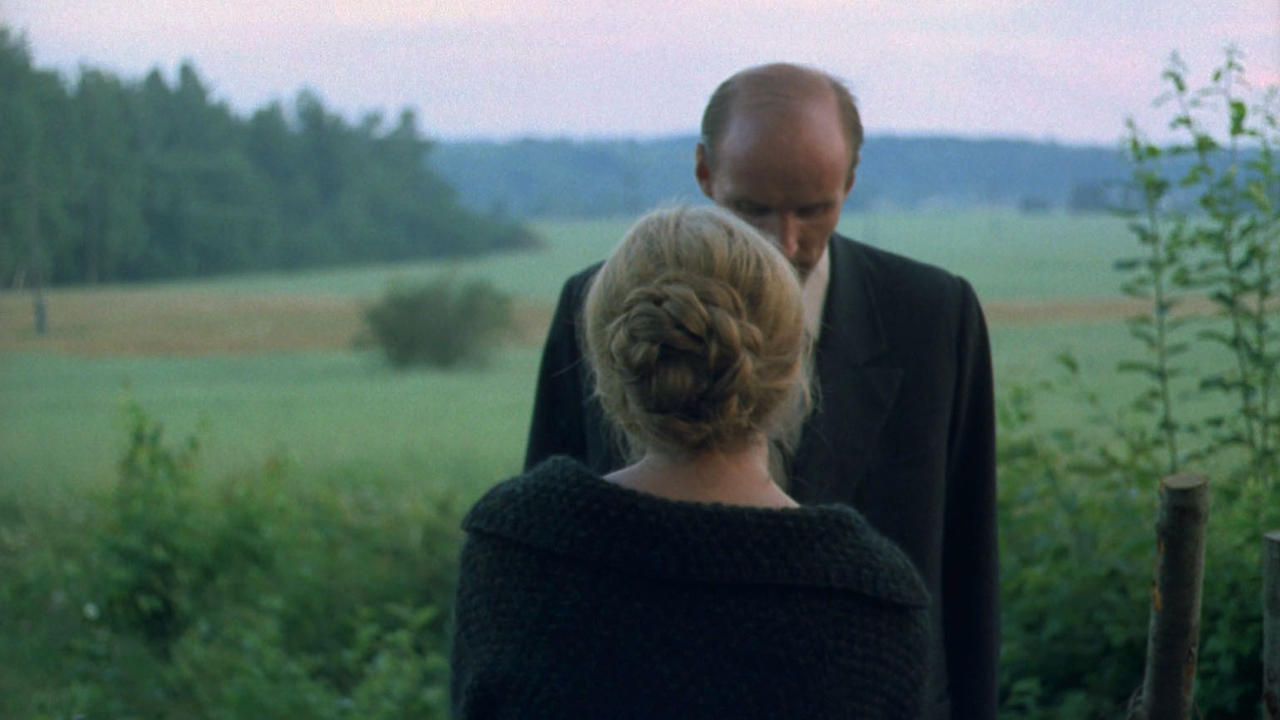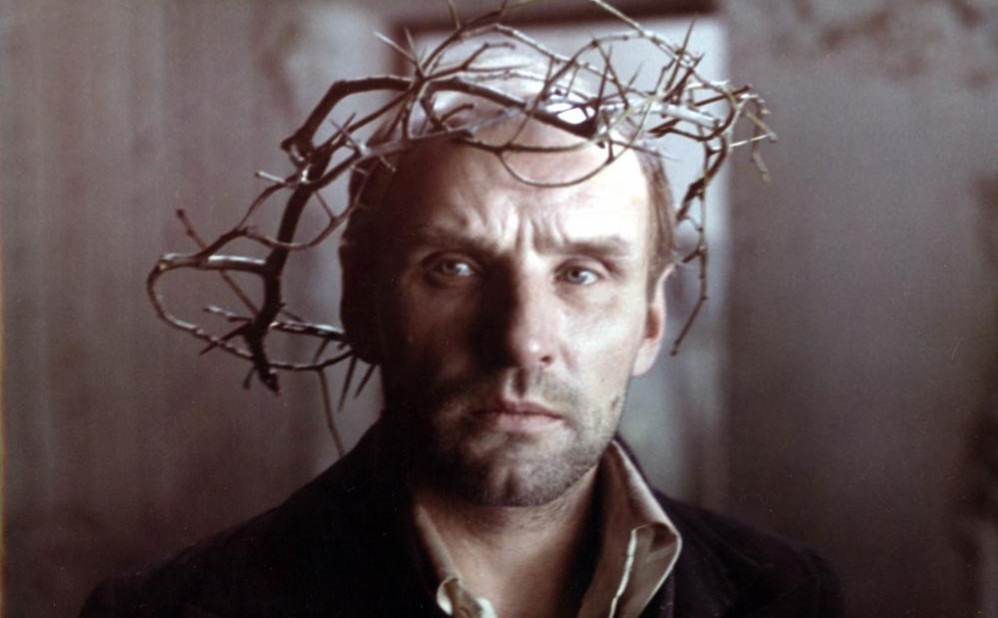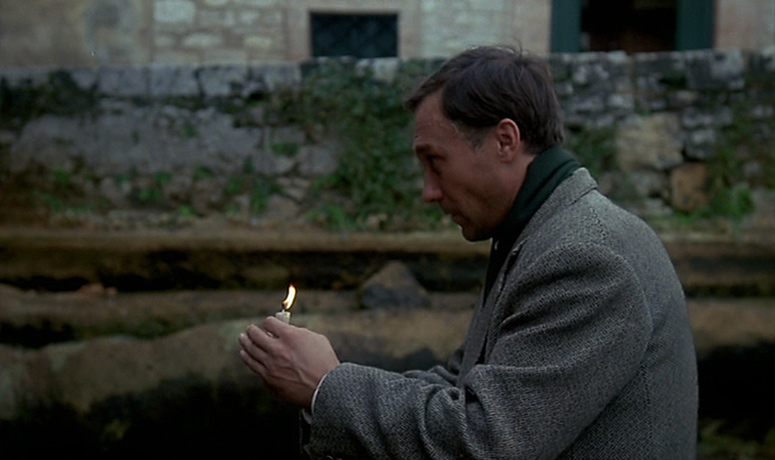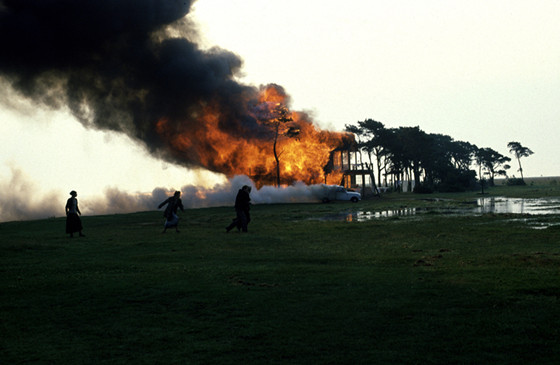4. The Mirror

Tarkovsky’s The Mirror is a dream, in which a man in his 40s is dying and, as is often the case in the arts, the dying man remembers fragments of his past. These fragments are from Tarkovsky’s own past, and they revolve around his mother, childhood, and the war. Of course, with Tarkovsky, there is always a deeper meaning, and the random glimpses we see of his past are both beautiful and allegorical in nature.
The Mirror is perhaps one of Tarkovsky’s most political films. The progression of images and memories symbolize a loss of innocence and an increase in corruption, which in turn stand for the loss of innocence and increase in corruption of the Russian state. Tarkovsky’s deep-seated frustrations with the Soviet Union come out, as well as his analysis of what may be causing problems in the Soviet Union.
Moreover, all of this is accomplished via a dreamlike prose, which begs for the psychoanalysis so popular at the time. I wonder how many in the Russian state committed to analyzing these dreams and, if anyone did, why they let it pass censorship.
5. Stalker

Tarkovsky’s next film ventures back into the Sci-Fi genre. Stalker is the suspenseful tale of a trip a stalker or guide (Aleksandr Kaydanovskiy) makes into the infamous “zone”, a supernatural area deep inside Soviet Russia. Inside this zone, there is a room that grants the deepest desire of anyone that enters. It’s important to emphasize “deepest desire” here, because one’s “deepest desire” may not be a wish of which one is conscious.. Again the film depicts a supernatural realm that can affect reality—notice a theme yet?
Stalker marks a philosophical break from Tarkovsky’s other films because it, like his later works, analyzes the themes and philosophical issues of all of his previous films. The film is an examination of faith, as everyone traveling to the room has faith in its powers and that the room will serve them well. It is an examination of knowledge and personal identity, as people are changed by the zone and have no knowledge of what will happen inside the room (or even how to get to it).
It’s a critique of the Soviet Union in its presentation of the government’s handling of the zone and its supernatural powers. It’s a critique of art, as we routinely see beautiful works of art discarded inside the zone, rusting beneath inches of water or decaying from the elements. Perhaps most of all though, Stalker is a return to the questions of Ivan’s Childhood, as we see characters look for a way to anchor their lives and find meaning.
That meaning is the hope the zone can provide, an other-world hope that the broken human nature depicted so desperately needs. His last two films analyze sources of meaning further, increasing the stakes and offering clues as to where Tarkovsky found meaning.
6. Nostalghia

Tarkovsky’s next film is a huge break in production quality, partially because it’s his first film directed outside of the Soviet Union. Most of the dialog is in Italian, it was filmed in Italy, and some of the financial support came from Italy. After his other films, he was a known and appreciated filmmaker who was able to get that kind of support. It also features and even focuses in on the works of Beethoven, marking another step up from the lower-production score of Stalker (which is, by all means, still amazing), to a higher production version of a piece of classic classical music.
The film follows Andrei Gorchakov (Oleg Yankovsky), a Russian writer who is in Italy researching an 18th century composer who lived there and committed suicide after returning to Russia. Andrei hopes to learn more during his time there, but things continue to get in the way and he eventually is distracted by Domenico (Erland Josephson), a local hero who tries almost daily to cross a mineral pool with a lit candle. Domenico is convinced that finishing this task will save the world. Everyone else is convinced he is insane.
Like Stalker, Nostalghia covers a plethora of philosophical issues, all of which were touched upon in Tarkovsky’s past films. Like Stalker too, Nostalghia is about the faith an individual has in some thing (this time an act and not a place) to cause a supernatural event. The fundamental difference here is that Tarkovsky has placed an existential element on this faith.
Specifically, Domenico is convinced that his act can save the world from sin and damnation. He is decried as insane, in many of the same ways that Kierkegaard claims Abraham must have been, but he trusts his direct communication with God and is willing to stake his life on it. We see this in the final scene, so prominently built upon Beethoven’s ninth, in an act that represents how faith in God takes precedence over life itself.
7. The Sacrifice

Tarkovsky’s final film, The Sacrifice is his greatest. It was made with actors famous from Bergman’s films (Erland Josephson had also acted in Nostalghia), and with a crew partially assembled from Bergman’s old crew, and filmed in Sweden. Like Solaris, it won the Grand Prix at the Cannes Film Festival, but unlike Solaris, it was not made with the restrictions of the Soviet Union holding Tarkvosky back. Because of this, it is provocative, troubling, and arresting in a way that Solaris could not be.
The film centers on Alexander (Erland Josephson), though in truth it is also largely an analysis of his son “Little Man” (Tommy Kjellqvist), and on the faith of each. Alexander is a former actor turned journalist who lives in relative isolation and is raising his only son. Nearby is Maria (Gudrun Gisladottir), rumored to be a witch with special powers. All that’s needed is crisis, right? Not too far into the film, we’re rewarded with crisis, as international tensions lead to nuclear warfare and holocaust.
So, what’s the film about? Tarkovsky manages to cover almost every topic, from metaphysics to aesthetics and from nihilism to fundamentalism and paganism. The central thrust though is that of existentialism, particularly as it pertains to Heidegger and Nietzsche, and its juxtaposition with faith. Their writings place an emphasis on man, his being in the world, and his soon-to-be inexistence in the world. Kierkegaard’s notion of man and existence is subservient to God and faith, and is clearly what Tarkovsky is embracing in The Sacrifice.
Returning to Fear and Trembling, Alexander finds himself in a position like Abraham, in which he must do the unthinkable to save his bloodline. Like Kierkegaard’s Abraham, Alexander knows he will be labeled a lunatic if he acts as he believes he should. Yet, he acts anyways, not only in the ways that God has told him to, but also on every other opportunity that seemingly might help him save his son.
This plotline is set up by Tarkovsky to accomplish several things: 1) it shows us how weak human nature is, in that Alexander tries everything imaginable to stave off holocaust and death; 2) it shows us that faith is powerful and ultimately effective, capable of saving what is dear to us; and 3) it places faith in the God of Abraham above any other faith (most clearly here above Pagan sorcery) as the key to, and source of, life.
Author Bio: Ben Wilson is a recent graduate of Yale College, where he studied Philosophy and Political Science. A film buff and addict, he views film as the proper medium for philosophy in the 21st century.